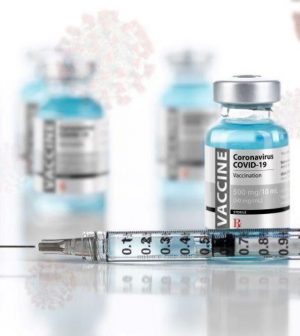- 10 Strategies to Overcome Insomnia
- Could Artificial Sweeteners Be Aging the Brain Faster?
- Techniques for Soothing Your Nervous System
- Does the Water in Your House Smell Funny? Here’s Why
- Can a Daily Dose of Apple Cider Vinegar Actually Aid Weight Loss?
- 6 Health Beverages That Can Actually Spike Your Blood Sugar
- Treatment Options for Social Anxiety Disorder
- Understanding the Connection Between Anxiety and Depression
- How Daily Prunes Can Influence Cholesterol and Inflammation
- When to Take B12 for Better Absorption and Energy
U.S. to Pump $400 Million Into Vaccination Programs for Other Countries

The United States announced Monday that it will pour $400 million into a new program that should help other countries speed vaccines to their citizens.
Called the Initiative for Global Vaccine Access, the U.S. Agency for International Development said in a statement the program would “enhance international coordination” to help countries “overcome vaccine access barriers.”
The agency added that it would focus on countries in Africa.
Most of the money will go toward getting shots into arms in remote areas and helping countries with vaccine policies and delivery logistics, the agency said. The remainder go where there are surges in cases and to help countries make their own vaccines.
The latest effort is above and beyond the $1.3 billion already committed to expanding vaccine access around the world. But one expert said the program, known as Global Vax, falls short.
“It’s not nearly enough to vastly ramp up global vaccination, but it’s a milestone,” said Lawrence Gostin, a Georgetown University law professor who specializes in public health, told The New York Times.
Meanwhile, Covax, the U.N.-backed multibillion-dollar vaccine alliance, has not met its goal to procure doses for poor countries. The alliance includes international health agencies and nonprofits whose goal is to make sure poor countries get vaccines as quickly as the rich. However, the alliance has struggled to get doses from airport tarmacs into people’s arms, the Times reported.
Biden administration officials have said that several African nations, particularly South Africa, are refusing vaccine donations because their supply exceeds the demand — in part because of vaccine hesitancy. But public health experts suggest another reason: Some countries are not able to distribute the doses they receive, which often arrive on short notice, the Times said.
The longer the virus circulates, the more dangerous it can become, even for vaccinated people in wealthy countries, they added.
More information
Visit the U.S. Food and Drug Administration for more on COVID vaccines.
Source: HealthDay
Copyright © 2026 HealthDay. All rights reserved.










